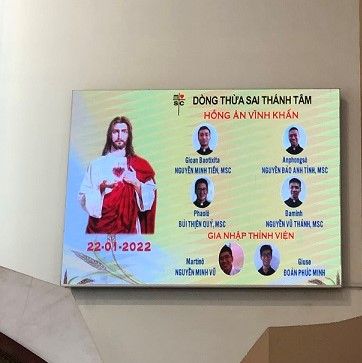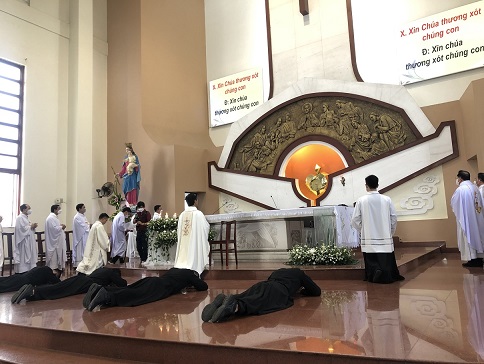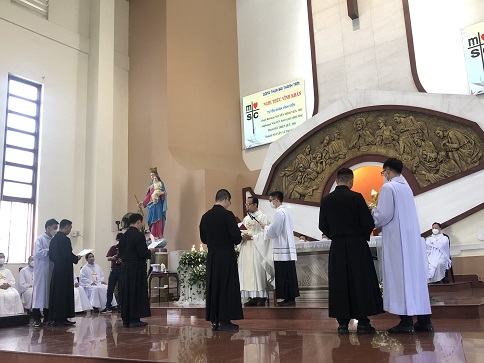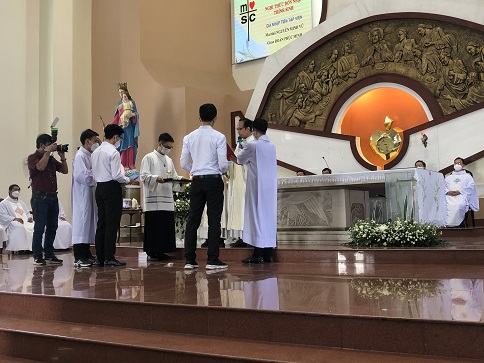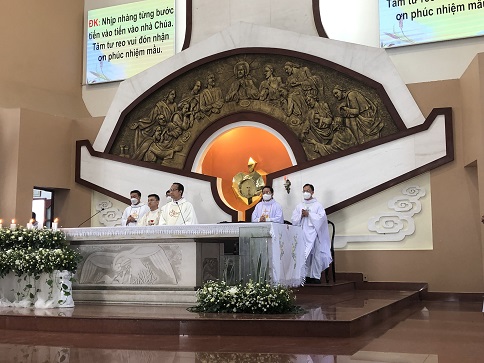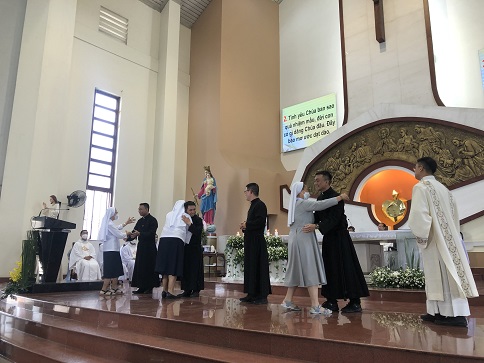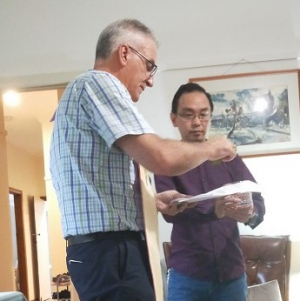Peter MALONE
January 2022 Professions in Vietnam
January 2022 Professions in Vietnam
Hoàng brings us the good news that last Saturday week four MSC made their final profession, and two men were accepted as candidates into the pre-novitiate formation program.
Providentially, despite covid, some isolation our website photographer, Trieu, was able to get a ticket and fly to Vietnam – and was present at the ceremony and sent these photos.
The finally professed were:
- Tiến Minh Nguyen;
- Tính Đào Anh Nguyễn;
- Quý Thiện Bùi; and,
- Thành Vũ Nguyễn
The two men in the pre-novitiate are:
- Vũ Minh Nguyễn; and,
- Minh Phúc Đòan
Hoàng MSC, the Superior, was presider of the liturgy.
He, on behalf of General Superior, received the vows of four brothers and accepted two candidates and placed them in the care of Danh, and Chung, the directors of pre-novitiate formation.
- Tet (Lunar News Year): Hoàng wishes us all a very happy Tet for Feb 1st, and may it be a year full of grace and blessings from God. They are all now in the middle of two weeks of holidays with their families and friends.
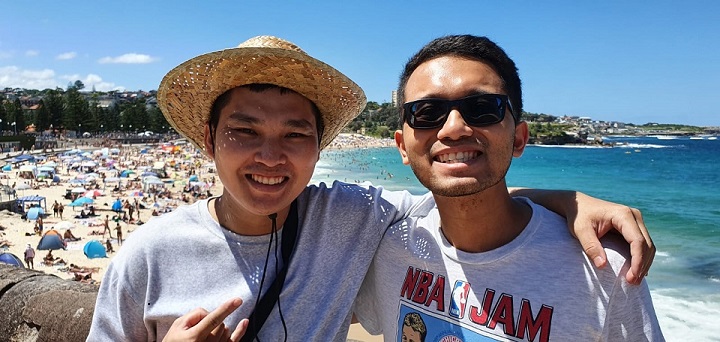
Meanwhile in Sydney, Hoa, has arrived from Vietnam. He was a student MSC, left, but has returned. He renewed his vows yesterday at Treand House and will join the community at Cuskelly House in Blackburn and will study at YTU. (Photo of Hoa with Daniel Magadia.)
Some Significant February Days for the Chevalier Family 2022
Some Significant February Days for the Chevalier Family 2022
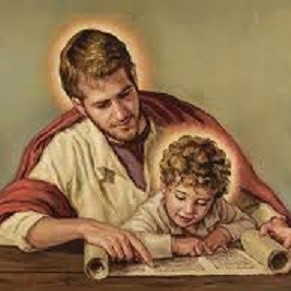
2 February, 1892
The title of Saint Joseph "Friend of the Sacred Heart" is changed to "Saint Joseph, patron and model of those of love the Sacred Heart".
5 February, 1900
Canonical Erection of the Congregation of MSC Sisters and approbation of the Statutes for five years.
6 February, 1855
Chevalier and Maugenest finish their second novena to the Blessed Virgin.
Their prayer is answered. They are promised 1000 francs, per year, from a generous benefactor, for their living expenses.
10 February, 1885
Fr. Verjus and three Italian Brothers leave Sydney for Thursday Island.
15 February, 1981
Fr. Juan Alonso Fernandez, MSC, of the Spanish Province, is violently assassinated in Guatemala.
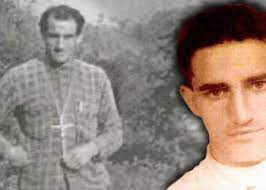
Juan Alonso Fernandez.
The commander of the post, told him that "it was disgusting for him to have a priest in front of him, that's why he spat on him, because it made him nauseous to see a priest." The Asturian Juan Alonso Fernandez endured a cruel torture that night. He said that "what they wanted was to kill me and I don't know how, they refrained from doing it, because I feel that they would have better killed me and not done what they did to me. In spite of everything, Juan did not give up. He celebrated the Eucharist in the village and went out to celebrate it in a neighboring village. There they waited for him, kidnapped him, tortured him again and shot him three times in the head. Days before, he had said, taking the crucifix that he always carried in his chest: "I became a priest because of this one, and if I have to die because of this one, here I am". It was February 15, 1981. He was 47 years old.
16 February, 1915
Fr. Charles Piperon dies in Thuin, Belgium. He was longtime companion and confidant of Jules Chevalier.
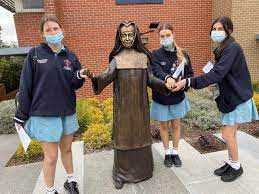
The Statue at OLSH College Bentleigh
22 February, 1908
Marie Louise Hartzer, first Superior General of the Daughters of Our Lady of the Sacred Heart, dies in Thuin, Belgium. She is buried four days later. Marie Louise had left France due to the expulsions of religious by the French Government.
23 February, 1945
29 Dutch MSC are freed form the concentration camp at Los Baños, Philippines.
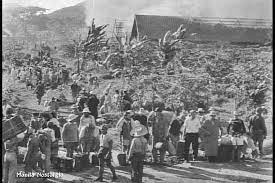
24 February, 1985
Fr. Henri Verjus arrives at Thursday Island after having left Sydney earlier in the month.
25 February, 1875
The Vatican orders that, in future, all new images of Our Lady of the Sacred Heart
must represent the Child Jesus on the arms of his mother, and not standing before her.
Naughton House, a Novitiate House, Blessing
Naughton House, a Novitiate House, Blessing
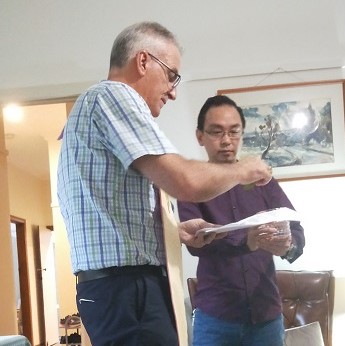
Members of the Melbourne Community gathered at 71 Central Rd Blackburn (which has served in recent years for student residence). The occasion was the Blessing of the house (which belongs to the parish) as a Novitiate House. Chris McPhee blessed the house, assisted by Khoi Nguyen who has the role of Novice Director.
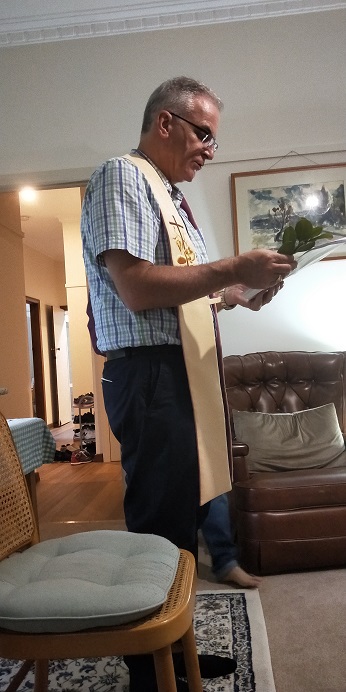
There was some hope for an outdoor ceremony. Instead, rain and some lightning and thunder.
The decision was made to name the house, Naughton House in honour of Terry Naughton. Terry was pre-Novitiate director at Croydon, then Novice Master, then at the Retreat House at St Mary’s Towers. Terry was Chris McPhee’s Novice Director and his mentor for the years Chris was Novice Director.
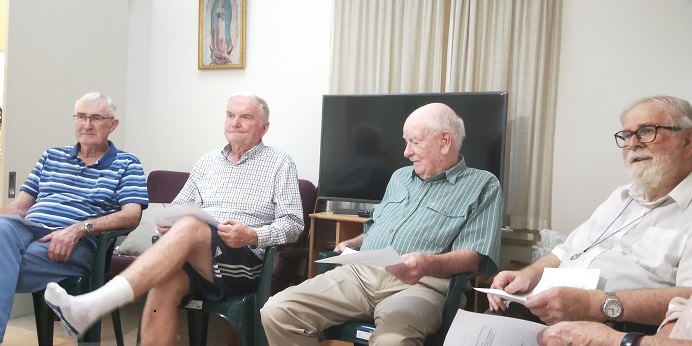
As a tribute to Terry’s spirit, your site editor puts in his two penneth. Terry succeeded me as pre-Novitiate Director. Some thought me too soft in the role. Then Terry arrived with his affirmations, cheerfulness and ‘Goodonya, champ, making me seem like Hitler.
Province thanks to Terry.

Peter Hendriks sent out the following explanation: Naughton House will be the second Novitiate House for our Province for a time. Why do we need a second novitiate house? Khoi, who is the Novice Director, has failing eyesight which can’t be remedied. He, Chris and the Council had a conversation and as a result, with permission from the General, we were allowed to nominate the house at Blackburn as an additional Novitiate. That means that Khoi remains in familiar surroundings as his sight worsens, and the property at Blackburn is a lot smaller and more manageable than St Mary’s Towers. The Novitiate will eventually return to St Mary’s Towers.

We took the opportunity to farewell Anh who will return to Vietnam this week.
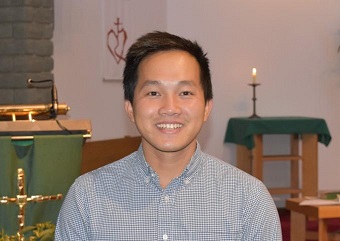
Daramalan College, 60 years, 1962-2022
Daramalan College, 60 years, 1962-2022
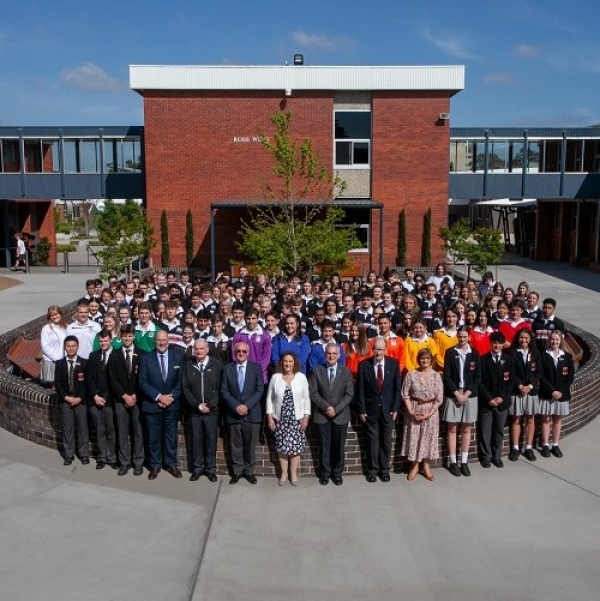
Daramalan College was founded in 1962 in the suburb of Dickson in the Australian Capital Territory by the Priests and Brothers of the Missionaries of the Sacred Heart (MSC). Initial enrolments comprised 240 boys in Grades 5 & 6 and Form 1.
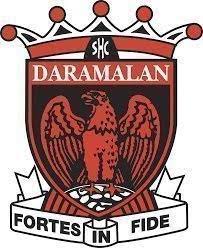
The name “Daramalan” is derived from an Aboriginal word “daramala”. When the great wedge-tailed eagle appeared in the sky, the people thought of the Great Spirit watching over their lives. For Daramalan, the eagle symbol signifies the Great Spirit of God who enfolds and protects us all. As the school song proclaims, Daramalan students are “eagle people”.

Fr J. F. McMahon was Daramalan’s founding Principal. The College expanded rapidly as Canberra’s northern suburbs developed and under the leadership of Fr John McCowage, classroom blocks, laboratories, technology, art and drama facilities were established. McCowage Hall was opened in 1971.
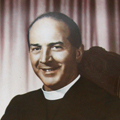
Fr Terry Naughton, longtime head of the Primary School.
In 1977, during the time Fr Jim Littleton was Headmaster, girls were enrolled in the Senior College for the first time.

Early innovations at the College included the pioneering of special education by Mrs Jean Reid and Media Studies was introduced by Fr. Arthur Braithwaite.

The annual Daramalan Art Show, as well the successful Music and Drama programs, were also introduced and they continue today.
The 1980s saw further expansion of the College’s facilities with a modern multi-purpose Sports Centre and additions to the Design and Technology Wing being built. Under the leadership of Fr Robert Irwin
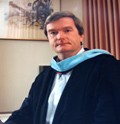
and later Fr Denis Uhr the facilities and grounds were developed to ensure that the college offered the growing number of students enrolled with a quality learning environment.
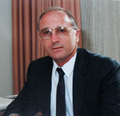
In 1996 girls were accepted into Year 7 for the first time and by 1999 the College was fully coeducational. With the introduction of girls into the High School, a decision was made to close the Junior School. In 1998, Daramalan’s first lay Principal Mr Frank Fulton was appointed to lead the College into the new century. He was no stranger to the college having taught at Daramalan from 1964 – 1966.
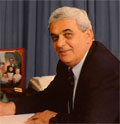
During this time a major building program was undertaken to upgrade the Library by combining the services for both High School and Senior College students in a single, modern Information Services facility. An upgrade of the main administration area and staff facilities was undertaken at the same time. Sadly, Frank Fulton did not live to see his project realised. He died suddenly in October 2002. The project was completed in 2003.
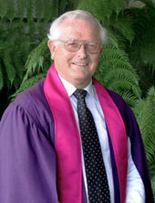
In October 2002, Mr David Garratt was appointed as the new Principal. The College building program continued with the generous assistance of our past and current parents. In 2003, extensive sound and light facilities for Drama productions were added to McCowage Hall and in 2008 a link corridor was added between the Reid and Sharpe Wings, resulting in much improved all-weather access around the school as well as providing a new locker area for Year 7 students. New classrooms and outstanding Hospitality facilities were opened in the Garratt Wing in August 2008. A Dance studio was opened in Sharpe Wing in 2009.
In 2009 Daramalan’s first female Principal, Ms Rita Daniels, was appointed. She came to the College with broad experience in all aspects of Catholic education including having spent 21 years at Daramalan previously, in a variety of roles including as Assistant Principal Curriculum.
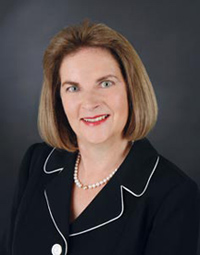
In 2012 the first stage of the replacement facilities for the current Lysaught Wing was completed and Federal Government funding for a Trade Training Centre for Stage 2 (including facilities for Automotive and Metal Technologies) was approved. This project was completed in time for the 2014 academic year.
In June 2014 the new Lysaught Wing was opened by Senator Zed Seselja and later that month it won an MBA Building Award.
In February 2015 the Littleton Wing extension was opened. It included a new canteen and a flexible learning area which are excellent assets to the college’s extensive facilities.
The new Dempsey Science Wing is a replacement of the original Science Wing from the 1960s, and was opened in March 2017.

Rachel Francis-Davies became principal in 2021.

The upgrading of the Main Quad (the old Year 10 Quad) with landscaping and shade areas is now finished and has been a welcoming and relaxing area for the students.
The next project will be the removal of the original Naughton Wing in late 2020 followed by the construction of a brand new state-of-the-art Performing Arts Centre which is planned to be opened in time for the College’s 60th anniversary in 2022.

Opening Day
The College has come a long way over the last 60 years. Second and third generation students are now an integral part of the Daramalan family and will continue to be for years to come.

Nightmare Alley/ 2021
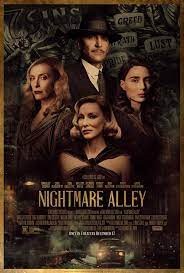
NIGHTMARE ALLEY
US, 2021, 150 minutes, Colour.
Bradley Cooper, Cate Blanchette, Tony Collette, Willem Dafoe, Richard Jenkins, Rooney Mara, Ron Perlman, Mary Steenburgen, David Strathairn, Mark Povinellli, Peter MacNeil, Holt McCallany, Clifton Collins Jr, Tim Blake Nelson.
Directed by Guillermo del Toro.
This film was based on a 1932 novel by William Lindsay Gresham,. It was made into a striking film noir in 1947, with the same name, and with the same names of the characters, the ending is softened somewhat because of audience entertainment expectations in the postwar period. However, it was not a box-office success. Now Mexican director, Oscar-winning for The Shape of Water (but whose films range from the war fantasy, Pan’s Labyrinth, two Hellboy films), Guillermo del Toro. He brings his distinctive vision, his eye for the fantasy and the unusual, the darkness, for magic and the mysterious.
The film runs for 2 ½ hours, the first hour focusing on life in a carnival. The central character, Stanton Carlisle (the distinctive performance from Bradley Cooper) is seen burying a body in an old house and setting the house alight – explanations emerging later during the film. He catches a bus, arrives at a destination, discovers the carnival, persuades the manager (Willem Dafoe) to give him a job, any job. And, we are introduced to the life of the carnival, the unusual characters who frequent those old carnivals often labelled as “freaks”. Most distressing of all is The Geek, the owner hiring down and out vagrants, drugging them, keeping them in a cage, urging them to bite chickens’ necks to survive – and the amazed crowd gazing and gawping on. There are mind readers. There is a young woman who has electric powers. There is the traditional strongman and his dwarf, The Major.
The cast is quite extraordinary, Tony Collette and David Strathairn as the mentalists, Rooney Mara as the electric girl, Ron Perlman as Bruno, the strongman. Stan fits into this milieu, learning from the mentalists and becoming skilful himself, in love with Molly, the electric girl, planning to run away with her – and, at a crisis moment when a sheriff wants to move them on, exercising the mentalist skills shrewdly, gaining sympathy as the sheriff understands his own life, their being allowed to stay.
The latter, longer part of the film takes place two years later. The action has moved from the darkness and the nightmare alleys of the carnival to New York City, a fashionable hotel and clientele, comfortable apartments, connections with rich families of the city, and a connection with a psychiatrist. Once again, interesting casting with Cate Blanchett as the psychiatrist, Richard Jenkins as a millionaire, Mary Steenburgen as a grieving mother.
While Stan has success with his mentalist show at the hotel, assisted by Molly who has to keep revising the tricks of the trade to help Stan, the psychiatrist comes to the show, a femme fatale in her style, challenging Stan. But, this leads to something of a deal with the devil, the psychiatrist offering him information about her clients so that he can insinuate himself into their lives, but her asking for psychoanalytic sessions so that she can understand him and he reveals his own inner secrets and are more.
At first, success, Stan becoming connected with millionaires, paid exceedingly well, and the psychiatrist holding the cash in her office safe. But, deals with the Devil bring their own hellish consequences – and, we trace the downfall of Stan, Molly wanting to leave him but persuaded to participate in one final confidence trick, confrontation with the millionaire, betrayal by the psychiatrist.
So, ultimately, Stan escapes, goes on the run, visits vagrant camps, eventually arrives at the carnival, under new management, but still with the act of The Geek. Stan is back where he started, only worse, a decline and the deepest fall. Which means that Nightmare Alley is interesting, dismaying, and a strong moral fable.
- The title? Applications? Nightmare situations – footage of the characters? The dark locations and alleys?
- The work of the director, his exploration of fantasy, imaginations, the sinister?
- The early 1940s, the background of World War II, American intervention, the role of Roosevelt? Costumes and decor? The vagrants and their lifestyle? The carnivals, the range of characters, the “freakish” characters and behaviour, being exploited? Work at the carnivals? The transition to more affluent society, hotels and performances? The wealthy in New York? Mansions? Psychology and settings? A film noir world?
- The structure of the story, the first hour, Stan’s story, and life in the carnival? Details of the life of those who work there, of the people involved in the acts? The transition then to 2 years later, affluent New York, dealings with the rich? And the comeuppance, Stan and his downfall?
- Bradley Cooper as Stanton Carlisle? Audience response to the opening, the dead body, the whole, burying, setting it alight, the house burning, his taking the bus, moving away? And his dreams, memories, his father, and the final memory of his confronting his father, his father dying of cold, taking his watch?
- Stan arriving at his destination, discovering the carnival, the encounter with Clem, Clem and his goading the Geek, biting the chicken, the reaction of the viewers? Stan being offered a job, the hard work, the accommodation, the carnival on the move, settling in the town?
- The film is detailed portraits of those who worked in the carnival, Clem, friendly yet ruthless, Zeena and Pete, their mind reading act, Peter and his alcoholic decline, Molly, the electricity act, Bruno as her protector, the strong man, the Major, his height, dominance, performance? The Geeks, Clem story, their being down and out, drugging them, a temporary job, replacing them? The atmosphere of the carnival, the crowds, the spooking? Molly and her electricity act? Zeena, the techniques for the questions, the substitute questions, Pete and his formulating the responses, Molly having to step in, Stan and his encouraging the audience?
- Zeena and Pete, the act, their backgrounds, Pete and his explanations, his past experiences, some dissolution, his book, the numbers and clues, Zeena knowing them, able to respond to the questions, the example of the woman in the crowd identified herself as the question of? Stan, learning from Pete, learning the techniques, putting it into practice? Pete, the alcohol, Stan bringing it, his death?
- Stan and Molly, Bruno’s protection and jealousy, Stan suggesting the electric chair for the development of the act? Asking Molly to leave with him?
- The arrival of the local sheriff, his contempt of the carnival, Stan taking over, using the mind reading techniques, the revelations to the sheriff, his change of heart, their protection? Stan taking the opportunity to take Molly away?
- The transition of two years, setting up in New York, their act in the hotel, Stan and his reputation, clothes, stash, suave? Molly, helping, but not always remembering the questions and techniques, her continually revising? The evening with Lilith in the audience, her taking over, asking the questions? Stan able to read her, even to the pistol in her handbag? Her returning the next night? And the wealthy guest, his questions about his dead son in the war? His wife?
- The rich man giving his card, Stan going to visit Lilith, the European decor of her office, their discussions, she is the femme fatale, the psychologist, having the information about the rich man and his story, deciding to give it, the money, to be held in her safe in the office? The deal, her psychoanalysis, her reading him well, his revelation of his background, his mother, father, hatred for his father?
- Stan using the information, the discussions with the wealthy man, the interview with his wife, his reassuring the wife about the son and his death? Her being reassured? The later scene, with her husband, the advice that they would be with their son, her shooting him and herself?
- The encounter with Ezra Grindle, a patient of Lilith, his wealth, mansion, his bodyguard continually with him, going to see Stan, the conditions, his grief at the girl who is pregnant, her death? The later revelation of his violence predatory behaviour? Wanting some kind of absolution? His bodyguard being sceptical, confronting Stan, ever present?
- Molly, the visit from Zeena, Bruno and the Major? Her phone calls to them? Feeling put down by Stan? Suspicious of Lilith? Her leaving, the note, Stan pursuing her to the bus station, his being ready for the final revelation to Ezra Grindle, persuading her to come back, the story about the electricity experience, dressing as Ezra Grindle’s girl, clothes, the blood?
- Grindle, impatience, used to getting his own way? The bodyguard sent away? Grindle, the demands, the cemetery, Molly’s appearance, Grindle rushing to her, the realisation that he had been swindled? The gun, the shooting? Stan and Molly escaping in the car, knocking over the bodyguard, running over him?
- The pursuit, Stan being chased, through the city, the railyards, getting on the carriage, the chicken cages covering him?
- Travelling, a vagrant once again, giving his watch?
- The return to the carnival, the new owner, the different acts, not wanting mentalism? Stan desperate, the drink, the drugs, and his becoming the geek? An absolute fall?
Munich - the Edge of War

MUNICH – THE EDGE OF WAR
UK, 2021, 130 minutes, Colour.
George MacKay, Jannis Niewohner, Jeremy Irons, Alex Jennings, Liv Lisa Fries, Jessica Brown Findlay, Mark Lewis Jones, Sandra Huler, Nicholas Farrell, Robert Bathurst, Ulrich Mathies, August Diehl,
Directed by Christian Schowchow.
This morning’s news said that one in four Australians has little or no knowledge of the Holocaust. So, what percentage would know anything much about the lead into World War II, the role of the UK, Prime Minister Neville Chamberlain going to Munich and the accusations of Appeasement?
Feature films on the 1930s continue to be released, a source of some information about this era. And, as the title suggests, this is one of those films. It is based on a novel by Robert Harris (always an exciting author with interesting film versions of his novels including Fatherland, Enigma, Ghost Writer). This reviewer had read Munich and found that the film version brought back solid memories of characters, atmosphere and the incidents in Munich in September 1938.
This is a British-German collaboration. While Neville Chamberlain appears as the central character and is significantly portrayed by Jeremy irons, the focus is on a young British civil servant and a young German who works in offices in Berlin. We see them initially, rather carefree at Oxford in 1932 – though the German, Paul (very effective performance from Jannis Niewohner) has been enthused by National socialism. Then, six years later, each of them very serious, the British man, Hugh Leggett (George MacKay who has emerged as a significant screen presence, Pride, True Story of the Kelly Gang, 1917), personal secretary to Chamberlain. Tensions at home, his being unable to reveal to his wife any details about his work. He is to go to Munich with Chamberlain.
On the other hand, Paul has become disillusioned with Hitler and National Socialism, is linked with an anti--Hitler military group, his associate, Mrs Winter (Sandra Huler from Toni Erdmann) has provided him with a top secret document outlining Hitler’s plan to go beyond annexing the Sudetenland, Czechoslovakia, but his more supremacist ambitions for land grabbing.
So, the core of the film: how to get this German document to Chamberlain to stop him signing the peace agreement, to help him see the true ambitions of Hitler.
Which means that there is some cat and mouse drama during the Munich meeting, the two friends meeting, exchange of documents, concealing of documents, attempts to bring them to Chamberlain’s attention, even Paul getting Hugh to persuade Chamberlain to see him. And, behind-the-scenes, there is Paul’s friend from the past, France (August Diehl) now bodyguard suspicious of the two men.
So, while there is interesting action drama, some split timing, the screenplay also offers an opportunity for audiences to understand Hitler and his ambitions, the esteem of the German people, his shrewdness in dealing with Mussolini and Chamberlain. And, for further impact for the film, veteran German actor, Ulrich Mathies, plays Hitler, rather older and more gaunt than usual, proud of his ability to stare fixedly at people and to read their characters, as he does with Paul who has an opportunity with a hidden gun to kill the Fuhrer.
Well written, well acted, taking us back into some of the complexities of the prewar period, and, perhaps, a bit more sympathetic towards Chamberlain and his intentions.
- Audience interest in the lead up World War II? The role of Neville Chamberlain? The Munich agreement? A dramatisation of Chamberlain and his stances, motivations – and a reassessment of his decisions and behaviour?
- A dramatisation of Robert Harris’s novel, keeping close to the novel, action, characters?
- The situation in Europe, September 1938, a year before the invasion of Poland? Preparations for war, shelters, gas masks? The politics of the situation? Attitudes towards Hitler? The issue of Czechoslovakia and Hitler’s annexation? His vision of expanding German territory, his motivations about the supremacy of the German people? The fascism of the time? Support from Mussolini? The threat to the French government? The role of the British government, possibilities for peace?
- The prologue, 1932, Oxford, the three carefree friends, Hugh, very British, Paul, young, believing in the future for Germany, Hitler? His relationship with Lenya? Her beliefs?
- The transition to 1938, London, war preparations, attitudes of the people, the politicians, diplomacy, Chamberlain and his relationship with Hitler? Chamberlain and his advisers, Wilson? Hugh as his personal secretary? You and his access to Chamberlain? But the strain on his family life, his relationship with his wife, the tensions, the sum with a gas mask and his being taken aback, unable to tell his wife details of his work?
- Berlin, 1938, Paul and his change of attitudes, the group against Hitler, the military, the plans? The background story of linear, Jewish, arrested, the alleged attempted suicide, her being in an institution? Paul, serious, his access to the Third Reich authorities? The past friendship with Franz Sewer, sports in the past, France and his being an official bodyguard, keeping an eye on Paul? Paul and his relationship with Mrs winter, in the office, personal, her ideology? And giving him the document with Hitler’s plans for expansion?
- The preparation for the meeting in Munich? Chamberlain suggesting Mussolini be present? The French authorities? The decision as to who should go? Hugh and his being on the list?
- Paul, the document, the contact with the British, the suggestion that he meet with you and pass on the document? The channels for negotiation?
- Hugh, the special mission, to collect the document? Wilson and others not knowing this? The flight to Munich, the reception?
- The portrait of Hitler, older and thinner? At meetings, his authority, demands, the intensity of his gaze, his pride in reading people? His reading Paul, borrowing his watch, a certain admiration? And the tense moment when Paul thought it was exposed but Hitler was merely returning his watch? Hitler and his advisers, translators, Himmler and Goering? The plan for the Munich meeting, the cover, future repudiation? Hitler playing Chamberlain and the French?
- In Munich, Hugh, left at the Embassy, going to the meeting, the assistance from the secretary in the office (and the later revelation of her relationship with France, anti-Nazi, rescuing the document, covering for Hugh)? At the meeting, the encounter with Paul, notes, leaving, the streets, the cafe, France and his observing? The discussions, Hugh to be persuaded of Paul’s change of heart? Taking the document, hiding it in his room, covered by the newspaper?
- The meeting, Paul and his urgency, wanting the agreement to be stopped? Going out of the meeting, going to Chamberlain’s room, persuading Hugh to let him in, Chamberlain agreeing, listening, disbelief? Paul and his urgency, advise not to lecture, but lecturing Chamberlain? The end of the meeting?
- Paul, Mrs winter, his having to be present for translations, the encounters with Hitler, the documents? His presence with Hitler, having the gun, the possibility of shooting Hitler, his hesitation, the moment passing? His self-recriminations?
- Chamberlain, the signing of the document, weary, seeing Paul, the aftermath? The risk to Hugh and his career? Chamberlain, shrewdness, engineering the second meeting with Hitler, the record of it, newspaper reports? The return to England, his being acclaimed?
- The diplomatic background, the various advisers, Chamberlain and his confidences, Wilson and his holdings Hugh back? The ambassador in Berlin and his role? The various authorities and their knowledge, need to know or not?
- The night, Hugh going to meet with Paul, Paul and his desperation? France, the searching of Hughes room, the document missing, and the revelation that it had been saved by the secretarial assistant?
- The return to London, a reconciliation with his wife, his decision to resign from public service, realising war was imminent, to join the RAF?
- Robert Harris and his skill in weaving a fiction story in the context of his story?
Indian Sweets and Spices
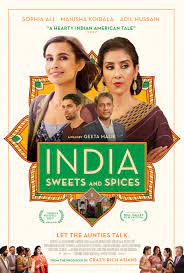
INDIA SWEETS AND SPICE
US, 2021, 101 minutes, Colour.
Sophia Ali, Manisha Koirala, Rish Shah, Adil Hussain, Deepts Gupta, Ved Sahu.
Directed by Geeta Malik.
More than probably some reviewer or blogger has said this is a Crazy Wannabe Rich Indians, via New Jersey. Most of the characters, especially those born in India and migrating to the United States have put a great deal of their life effort into appearances and keeping up appearances. So, one of the underlying themes is Secrets and Lies. (Just checked, the first blogger on the IMDb made the connection but was caught up less in the plot – a pity – but more on the gorgeous costumes!)
While the film is an American enterprise, the writer-director and the star have Indian background. Many of the supporting cast have the same although Sheila, the mother character (Manisha Koiorala), is from Nepal originally and the other main character, Bhairavi Deepta Gupta), is from Pakistan.
As regards the title, it would seem to indicate that this is a “foodie” film. While there are a number of parties, and some more than passing glances at some of the food being served, it is not a focus on the kinds of food, preparation and cooking, serving. That is taken for granted.
Rather, this is the story of Alia (played most engagingly by Sophia Ali), American born, comfortable in American style and culture, respecting the Indian traditions. She comes home for the summer break from UCLA, finding the Indian traditions somewhat oppressive, respecting her father, rather alienated from her snobbish mother who seems to embody the haughtiness of the Indian tradition and preserving appearances.
There is a complication when Alia goes down to the popular store and market, Indian supermarket where everybody shops – but the women would not be seen socially with the owners! Alia notices, quite instantly, Varun (Rich Shah), the owner’s son working during the holidays. Love story elements at once – although, the community has expectations for Alia and the son of a prominent family, Rahul. Impulsively, Alia invites them to her family’s party.
And, then the plot changes, quite unexpectedly and dramatically challenging and satisfying. It means a shift of attention from Alia’s father to her mother, on unmasking, so to speak, revelation of secrets and lies as well as an admirable history of feminism in Delhi in the past decades.
So, not exactly comic. Rather, a delving beyond the appearances, and unmasking of the hypocrisies that the somewhat closed community are determined to preserve. But, unmasking, removing the mask, seeing the real face and the humanity becomes liberating. As it does for Sheila. As it does for Alia.
- The title? Expectations? Crazy Rich Indians variation? The shop and market? Not a foodie film – but glimpses of food at the parties?
- The opening in California, universities, campus, social concerns? The transition to New Jersey, the neighbourhood, affluent, homes and mansions, streets, the store and market? The musical score and atmosphere?
- The Indian community in the United States, migration from India, holding on to traditions, costumes and decor, food and celebrations, keeping up reputations and appearances? The next generation, born in the US, very American, respect to the traditions but more relaxed in American styles?
- Alia and her story, studying in California, friends, social concerns, return home for the summer, her attitude towards the neighbourhood, critical of its pretensions, yet her affluence, money, no worries, the lavish home, the pool? Her age, admiration for her father, wariness of her mother and her snobbery? The other children and relating with them? Her friends, confidantes, Rahul and expectations?
- The adult generation, manners, appearances, affluence, professions, homes, entertaining, women and the outings and gossip, professional men in golf?
- The contrast with the market and the store, supermarket atmosphere, the family service, Alia’s visit, seeing Varun, the instant attraction, mutual? Her inviting the family to the party? Their arrival, bringing food, but on the outer, the snobbery of the women who shopped there but not wanting to mix socially?
- The surprise of the two women meeting, Sheila, unwilling to acknowledge Bhairavi, recognition, snubbing? Alia and her reaction? With Varun and Rahul, going upstairs, her father and Rahul’s mother? Her shock?
- The shift in plot development, audience disapproval of the father, his behaviour, over the decades, the family and secrets and lies? Sheila, Alia finding the photo, the protesting feminist group, going to the store, explanations by Bhairavi, Alia and her surprise? Putting the photo on the notice board? Her mother’s reaction? The father seeing the photo and putting it in the bin?
- The continued parties, the socialising, Sheila going with a group of women, their chatter, gossip about her, Alia overhearing them at the party? Alia and her disgust and leaving the party? Going to Varun?
- The clash with Varun, his talking about her money and comfort, her having to face truth about herself? Varun upset, the gossiping sisters, after being criticised by Alia in the street, the photos of Alia and creating mischief? Viral and believing them, breaking with Alia?
- Sheila, her change of heart, discussions with Alia, the flashbacks to the past, the oppressed women, young, their group, feminism, shaving their heads, protest, the police, the woman in difficulties, Sheila helping, sent to prison, released to her family, their shame, the arranged marriage and sending her to the US? The farewell look to Bhairavi, her husband, the ceremony, the plane to New Jersey?
- The challenge to Sheila, going with Alia to visit Bhairavi, Varun hearing?
- The discussion about the anniversary, Sheila challenging her husband, his dismay, his reputation, the expectations of the faithful wife and mother? His many affairs, defying Sheila and going to golf?
- The party, Sheila’s decision, confronting her husband, the expose of the secrets and lies, all-around community, double standards, pretence? The arrival of Alia, her head shaved? Sheila ousting her husband?
- Alia, reconciliation with Varun, their meeting up in UCLA? Sheila taking her daughter to the airport, her husband saying home and minding the children?
- Alia and packing and finding the framed picture of the protesting women that her mother put in her luggage?
- A portrait of the Indian community, values, hypocrisies, exposure?
Within
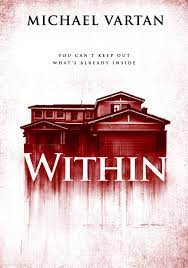
WITHIN
US, 2016, 88 minutes, Colour.
Michael Vartan, Erin Moriarty, Nadine Velazquez, Ronnie Gene Blevins, JoBeth Williams, Dorian Kingi, Blake Jenner.
Directed by Phil Claydon.
The basic outline of this horror thriller is very familiar. A family moves, mother, father, teenage daughter – and clashes within the family. Then eerie sounds are heard, disruptions, cupboards needing shutting. Which means then that this is a haunted house variation. There is a revelation that there were murders in the house, the father not telling his wife and daughter to avoid upset. Further investigation reveals the nature of the deaths of the family, further information about an unknown brother who suffered from agoraphobia, and his psychological reports indicate that he has imaginations of homicide.
Which means then that the film works on the level of ordinary family life – in fact the opening 30 minutes which, in view of what is to happen, does slow the impact down. There are some unexpected twists, the revelation of the person in this crawlspace and then, the violent attacks – and, cleverly written, the final deaths repeating the pattern of the deaths of the previous family.
The film was written by Gary Dauberman who had written Annabelle but was to go on to write further Annabelle films and The Nun as well as prominence with the screenplays for Stephen King’s It and its sequel as well as Salem’s Lot.
- The title? Originally Crawlspace? The tagline – you can’t keep out what is already within?
- The city, the suburbs, the streets, the house, interiors, rooms, garage, attic, crawlspace? Atmospheric score?
- The familiar situation, the family, the father out of work, employment, moving house, the daughter upset and missing her friends, grounded, the wife adapting? Buying the house, settling in, furnishing? Ordinary situations?
- Eerie suggestions, sounds, nails falling out of walls, the audience seeing coverlets being removed, sinister presence?
- The focus on Hannah, her age, contact with her boyfriend, his visit, the sexual encounter, the aftermath? His being killed by a David? Hannah, clashes with her father, reliance on her mother? The encounter with Ray, her camera, the images on the camera, its disappearance, reappearance? In the garage, going through the boxes, the photos, the drawings
- information about the house, the murders in the house, the photo, killing of the mother, hanging the father, the attack on the daughter near the front door – and the way this was resumed for the final climax of the film? Effective?
- Ray, the locks, into the house, more expensive blocks, his resentment, coming into the house, spying on Hannah? His unexpected death?
- Hannah and the attic, sense of the presence, her father checking? During the night, the refrigerator, each drinking the milk? The parents out, the drink spiked, her father’s anger with her?
- Information about the family, the neighbour and her explanations, the revelation of the brother, the certificates and information, agoraphobia, ideations murder?
- The attack, the presence, in the attic, in the crawlspace? His attacking Hannah, confining, her breaking free, climbing, in the attic? The police, the dead policeman, being taken away, the family thinking they were free? The decision to go to a motel?
- The final attack, the hanging of the father, the death of the mother, the confrontation between Hannah and David?
Disclosure/ 2020
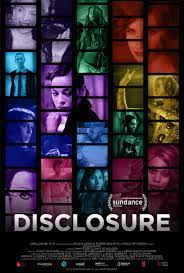
DISCLOSURE
US, 2020, 108 minutes, Colour.
Directed by Sam Feder.
In recent years, there have been a considerable number of documentaries, many from the United States, portraits of people who have transitioned from one gender to another. They have been informative. They have been sympathetic. There have been strong interviews with this people themselves, their families, doctors, psychologists… And they have enabled the public who view these documentaries to appreciate why a person has made the decision to transition, the repercussions, physically, mentally, emotionally, and the step towards a new life in the different gender.
In this documentary, one of the interviewees remarks that most people have not encountered someone who has made a gender transition. And then hands that many trans-people have not encountered them either. To that extent, the general public seems to be rather “sheltered” in experience of this significant experience in the lives of many individuals, the repercussions of the change, for themselves, family and friends. Acceptance and non-acceptance.
Which means that for many people, most people, information about transition comes from the media. This is through interviews, talk shows… But, there are also the images of trans-people over the last hundred years in film and television.
The value of this documentary is the large number of excerpts highlighting the impact of film and television on public consciousness about transition. The filmmakers have found some very early clips of films on this theme, even from 1914, mainly about men dressed as women, becoming women. There are fewer clips about women becoming men.
With the selection of clips from sitcoms over the decades, the interviewees indicate how detrimental these images, situations, interpretations can be, singling out particular aspects, aspects of cross-dressing, aspects of violence towards trans-individuals (especially African Americans in the US), the comedy of characters discovering that a woman was physiologically a man and consequent vomiting in discussed (clips from a number of popular films including Ace Ventura). The clips range from films and television series from the 1970s on.
The film has a wide range of interviewees, especially those who have made transitions to actor or actress, especially focusing on love and Cox, interviews, her career, and being an executive producer of this documentary. The range of interviewees has more trans-women than trans-men. However, they speak of their experiences, their work in theatre and on screen, their difficulties, the greater understanding and acceptance as the 21st-century has moved on.
This could be a significant film for the general public, opening up the themes of transition as well as looking at and listening to how trans-people have been presented in the entertainment media and the consequences for public consciousness.
Dumplin'
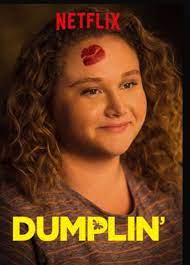
DUMPLIN’
US, 2018, 110 minutes, Colour.
Danielle Macdonald, Jennifer Aniston, Odeya Rush, Maddie Bailio, Bex Taylor Klaus, Luke Benward, Dove Cameron, Harold Perrineau, Kathy Najimi, Hiliary Bagley, Sam Pancake.
Directed by Anne Fletcher.
Dumplin’ is a nickname for Will, Willowdean Dixon, called this by her mother who tends to ignore her, Will feels the hurt, and the scoffing and bullying at school in naming her as “fat”. There are some rather bigger actresses than usual in this film, a vindication of their right to be in the films, not to be judged by their bodies or their appearances, but by who they really are. They are women of “bigger build”.
So, there is a message from this film – and, the surprising fact that practically everybody in the film is sympathetic when, according to the conventions, there should be a whole lot of pettiness and sniping going on.
Will is played by Australian Danielle Macdonald (Patti Cakes), devoted to the main influence of her life, Lucy, also a big woman, but happy, exuberant, common sensed, her wise advice to Will when young. And, into Wills of life comes a friend, Ellen (Odeya Rush), whom we see is very pretty, though this is not remarked on, but the two of them bonding and growing through childhood into teens together in a constant friendship.
The other main star of the film is Jennifer Aniston, taking the opportunity to do something a bit more serious, but also some comedy and some nice sending up of the Jennifer Aniston image. She is Rose, Will’s mother, also influenced by Lucy but not acknowledging how much. In the meantime, she has become the local beauty queen, the expert on pageants, her life devoted to the pageant each year rather than to her daughter whom she takes for granted.
At the centre of the film is the local beauty pageant – the subject of quite some mockery in many films but here taken rather more seriously, even though Will has the ambitions to sabotage the event. However, she and Ellen and their friend, Hannah along with another very big girl, the ever optimistic, Maddie (an exuberant screen presence, Maddy Baillio), sign-on, go through the interviews, the test of talent, dance preparations, rather tongue in cheek.
It would be wise to mention that this is a Dolly Parton fan film, her songs played and sung throughout the whole film, and a club where drag Queens perform her songs on stage. The crew at the club were great friends of Lucy, welcome Will and her friends, go to great lengths with advice as well as costumes for the pageant, turning up to applaud loudly during the event, vindicated.
The pageant does not go quite as we might imagine – although, it is very nice in so far as all the girls are friendly and collaborative, no plots to undermine the others, and the judges all very simpatico.
And, there is a very nice handsome boy at the diner where Will works who is attracted to her, kisses her, Will not being able to believe that he could like her – but, he does and he joins in with all the rest going to the club, Dolly Parton songs and glee, a celebration of everyone, but especially, girls with bigger build.
- The title, the nickname, Rose’s use of it, Will and her dislike, eventually coming to terms – only a word?
- The Texas settings, the small town, homes, school, diners? The world of pageants, meetings, interviews, rehearsals, promotion, the pageant itself? The musical score?
- Homage to Dolly Parton, the range of songs, Will and her devotion, the club, the drag queens and the performances?
- Will, Willowdean, a large girl, with Lucy, Lucy as large, buoyant, cheerful, encouraging Will, educating her, in the absence or disdain of her mother? Lucy and her death, an absence, her mementos, Will searching through them, Rose and her having to appreciate Lucy more? Lucy’s influence on Will?
- Ellen, as a young girl, meeting Will, their immediate bonding, sharing, Dolly Parton, visits, chat? Ellen being mistaken for Rose’s daughter? Their growing up together?
- Will, her work at the diner, improvising and saving situations, friendship with the workers, Bo and his interest in her, their talking together, her not having confidence in herself, the kiss, happy, fearful, leaving, later conversations with Bo, eventually coming to him after the pageant, and his being present at the celebration at the club? The handsome boy and his admiration for the large girl?
- Will being mocked, school, been called fat? Her defending herself and attack against bullying? The principal calling for her mother? But Will being encouraged?
- Beauty pageants, their place in the US, in towns? Rose winning in 1991? Her eventually telling Will the story, not enough money for the dress, Lucy improvising? Rose and her later career, advice, committees, organising pageants? To the extent of neglecting Will?
- Will and Ellen, image and beauty, wanting to sabotage the pageant? The friendship with Hannah? Goth, nonconformist ways? Their forming a team? The friendship with Millie? Her exuberance?
- The interviews, each explaining herself, the exhibition of a talent, Millie and the hoops, Hannah and the martial arts, Will and magic? The falling out with Erin, Erin hurt, Will being wilful and the consequences?
- The visit to the club, memories of Lucy, the hosts, Lee and the impersonation, taking Will aside, encouraging her? Millie and her enjoyment? The return, the large lady and teaching Will the magic tricks, Millie and her costume and singing?
- The other contestants, glamour, but their not being catty or undermining each other? The judges and their being fair and appreciative? The niceness of the pageant?
- Will and her speech on loyalty, her mother listening, Ellen for giving her?
- The expectations of the town, the number of days down to the pageant, the preparations?
- The pageant itself, the introductions, Will disqualified because of the costume alterations and rules? Change? But able to escort Ellen on stage? The reconciliation? Dresses, talent, Mille singing, Will and her magic success – and the coach and the others from the club in the audience, cheering?
- Millie, not telling her mother, her mother’s arrival, the confrontation, Millie standing up for herself, the members of the club, the mothers change of heart, cheering?
- Lee, Sam, the welcome to the club, memories of Lucy, performances, coaching, the pageant?
- Will, the reconciliation with her mother, their talking, memories, the dress not fitting, the club dresses coming to the rescue and Rosa’s response?
- Will, going to see Bo, the kiss? And the happy celebrations of everyone at the club, Dolly Parton songs, everybody on stage?

